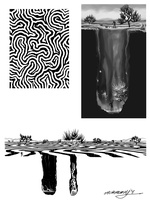Brandon Sanderson
All right, folks! Time for the fifth update. This should be the last one that I post before some redditor inevitably beats me to the "It's Done!" post by watching my twitter feed very closely.
I do hope to post another update or two during the next year, discussing how the editing and publication process is proceeding.
Part Four is done as of half an hour ago. The part is around 80k words long, and brings the book total so far to 420k words. Final book is still projected at 450k, though I do plan to try to trim it back in revision. (Tor's book binding company can't do a book longer than Words of Radiance, so if I go longer, we have to shrink the font or change binders. I won't cut important parts of the book just to meet this length requirement, but I also generally need to trim significantly in revisions to tighten language.)
Part Four turned out very well, and I'm very pleased with the book so far. I consider it as strong, or stronger than, book two. I also don't see any major structural or characterization problems that will slow editing. (So far, my editor's comments on Parts One and Two have been minor, save for the slow-down in Part Two that I was aware of--and probably don't mind existing, since Parts Three and Four are much faster, and the characterization in Part Two is strong.)
If you're following the Visual Outline from the second update, there structure of the book has undergone some revisions as I've worked through it. It now looks something more like this
Unlisted is that I nudged one flashback into Part Five. Shown is that Secondary Main character #2 had their viewpoint stretched through all five parts, but has a slightly smaller number of viewpoints in all of them. I juggled tertiary characters, making Parts Two and Four the expansive ones (with many viewpoints) and Parts One and Three the narrow ones (with a focus only on the main characters.) Yes, this is complicated, and you don't need to pay any attention to it. I posted this for those who like to dig into these things.
I'm going to power forward into Part Five starting tonight, then do a second draft of Parts Four and Five together. (I'm not sure why I'm treating those like proper nous.) After I turn that in, I will still need to write the prologue, some of the interludes, and the epigraphs. (Those little bits of text at the starts of chapters.)
And then, revisions. My favorite part. Yay.
As with previous threads, I'll try to post answers to questions where I can--but I have to balance that with the actual writing, so some questions will go unanswered or get a quick RAFO. I apologize in advance for that. Despite jokes to the contrary, I really am just one person, and I can't do ALL THE THINGS, as much as I would like to.
Also, thank you to the community for your kind words. I know that people joke about my writing speed, but this book has taken over a year of dedicated writing--and that's not counting the year before of outlining and writing out some of Kaladin's chapters. It's been two full years of work, and then some, to finish this book. With another six months of revision ahead. Together with other projects, that will make three and a half years between books two and three. So I do beg your patience with this series. The books take a lot out of me, and while I'm very proud of the result--and consider this series to be my opus--the novels aren't going to be terribly fast in their release schedule.

